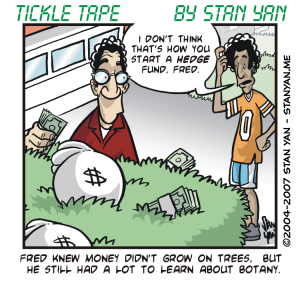When playing a formidable opponent, it’s wise to take a defensive stance. An NFL quarterback uses shoulder pads and a helmet to make sure he has protection in case he gets sacked. The players on the line also protect him as much as possible. It would be dangerous to take unnecessary risks, for the overall game plan or for the physical safety of the players. Traders take similar precautions. While the amateur trader may put on a trade without a detailed trading plan, or without adequate risk controls, the seasoned, profitable trader accounts for every possible contingency. Each element of a trading plan is specified in scrupulous detail.
Whereas the amateur trader is often overly optimistic and overconfident, the seasoned trader is realistic. Trading is difficult. Many adverse events can go against a trading plan, and the survivors know they must take precautions to protect themselves from every possible contingency. Sometimes it’s useful to take a defensive and pessimistic strategy, rather than looking at the world through rose-coloured glasses. A study by Dr Nancy Cantor shows that for some people and under particular conditions, it’s useful to be on the defence.
Dr Cantor and colleagues studied two groups of people she called the rosy glow optimists and the defensive pessimists. University of Michigan students were followed throughout the semester. At the start of the semester, participants were asked to predict their end-of-semester grades, and throughout the semester, they reported their emotions on a daily basis. Rosy glow optimists viewed academic tasks as challenging but not especially overwhelming. Defensive pessimists, in contrast, viewed academic tasks as difficult and a little stressful. They believed in taking precautions and putting in a heroic effort.
They underestimated their talents, setting defensively low expectations despite a past record of stellar performance. Holding a pessimistic outlook helped them maintain discipline and curb overconfidence. Throughout the semester, defensive pessimists felt greater stress and anxiety than rosy glow optimists. But this pessimistic outlook was not debilitating. In fact, among the pessimists, unpleasant emotions were correlated with higher grade point averages at the end of the semester. Pessimism did not have an adverse influence on performance. Indeed, it seemed to help rather than hurt.
Under the right circumstances, and for certain people, pessimism is beneficial. Considering that several studies in behavioural finance have shown that traders tend to be over-confident, it may be useful to question one’s confidence occasionally (before putting on a trade, not during, however). Ask yourself, “Am I really certain that this trade is going to be successful, or am I taking an unnecessary risk?” “Have I put in enough time and preparation into this trading plan?” It couldn’t hurt to use a little caution. When it comes to trading, it’s often prudent to take a defensive position.


